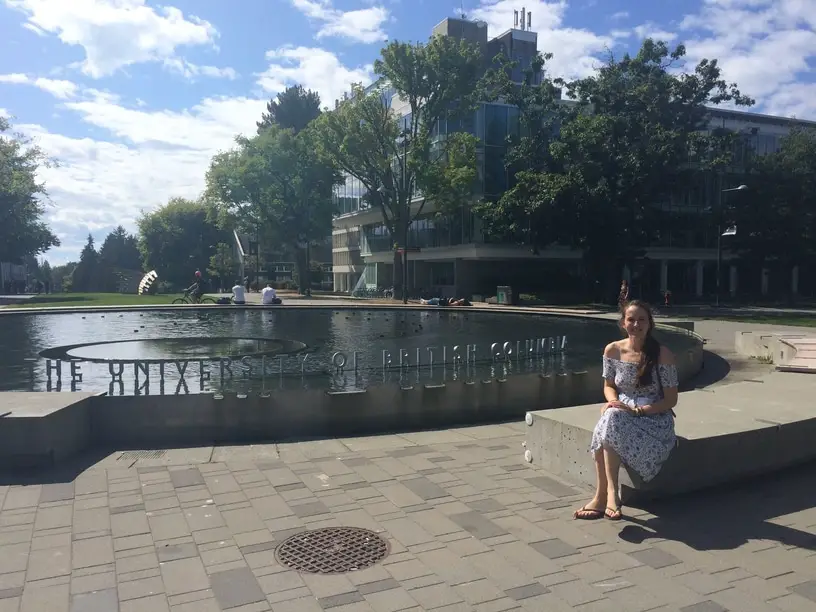We are currently a Master’s student at UBC and a PhD student at SFU living together in Vancouver. As a couple, we have the advantage of being able to share the costs of living in this expensive city, and were fortunate enough to come up with grant and scholarship money to cover tuition.
However, we hope that by providing a general price breakdown of living expenses, we can help some other students out there get a very rough idea of it’s like as a student in Vancouver.
As graduate students in Vancouver (in our experience living as a couple) we pay approximately $2,335 CAD each per month.
Here is our basic cost breakdown per month, per person, with a detailed explanation to follow:
Of course, this can vary enormously depending on your specific situation and lifestyle tastes! In our lives as grad school students, we try to be as frugal as possible. All costs are PER PERSON, PER MONTH (for a couple):
| Expenses: | Cost (in Canadian Dollars): |
| Rent (1-bedroom apartment) | $765 (EACH – $1,530 total) |
| Electricity | $25 |
| Home insurance | $15 |
| Internet | $30 |
| Cell phone | $40 |
| Car transportation | $60 (car share rentals) |
| Public transportation | $0 (part of university student fees) |
| Healthcare | $0 (part of university student fees) |
| Cost of food (groceries, eating out) | $500 |
| Miscellaneous costs | $300* |
| Tuition | $600 (domestic – UBC)* |
| TOTAL | $2,335 CAD |
- *Tuition: Your tuition costs will depend on your specific scholarships, grants, university in Vancouver, immigration status, department, and program.
- *Miscellaneous costs: This includes residual undergraduate student loan payments you may have to pay; funds paid into savings and investments; going out and fun; laundry costs, household items, other entertainment such as Netflix, etc.
- Total: $2,335 Canadian dollars
Rent: $765
Rent is the biggest expense in Vancouver! It seems to be constantly under debate among Vancouverites, but still the prices keep going up and up. Ours went up $55 this past year for no reason.
In 2013, we were able to rent a fairly spacious, amazingly-located basement apartment in a nice neighborhood (Kitsilano) close to the University of British Columbia (UBC) for under $600 per person, all included. That is unheard of these days. A friend of ours lives in a similar situation now (basement apartment close to UBC) but by himself and pay $1000 which is considered a good deal at the moment.
Now, we rent a 1-bedroom together for $1670 (including utilities – electricity, insurance, and Internet)—a price which will probably go up again soon. Average rent prices for students/people not making a lot of money seems to be in the range of $800 – $1200-ish per person, depending on whether or not you want a shared space.
According to Padblogger, the average cost of a 1-bedroom apartment in Vancouver (in May 2019) is $2,130. Gah! However, many students decide to live in shared houses, basements, or in residence halls at the university.
To find a place to live in Vancouver, many people search Craigslist Vancouver, but beware of deals that seem too good to be true or ask for money before you’ve seen the place in person—there are scammers out there who take advantage of people desperately seeking good apartment deals. Go in person and check out the place for yourself. Or use your intuition, set up a Skype chat, etc. before agreeing to a place that you haven’t yet seen.
Many places in Vancouver require a 1-year lease for your first year before you can switch to a month-to-month lease. So, try to be really sure of the space and location before signing anything.
You should also know that landlords are required to give you your security deposit back by law in Vancouver—If they have a problem with the state of the apartment when you’re leaving, they must take you to court in order to keep the security deposit. If you feel like you deserve to keep your security deposit, demand it and tell your landlord they’ll have to take you to court if they want to get it back.
Utilities: $40 (excluding laundry)
In our building, we’re required to pay for renter’s insurance and electricity each month, itemized in the list above.
We also pay for laundry. There’s a shared laundry room in our building that charges $2.00 per load.
When looking for a place, make sure to check how much your utilities will cost you, as this might significantly increase the price you thought your rent would be!
Internet: $30
We installed Shaw. It’s a huge provider and offers a student discount for the first 6 months. You can also access “Shaw Open” Internet on your devices in many areas of the city which is nice for saving money on cell phone data. Having a partner or roommate(s) really comes in handy when splitting the Internet bill!
Cell phone: $40
We started our cell phone plan with Koodo in Montreal, and it was about half the price of the cheapest cell phone plans in Vancouver. So, if you happen to be visiting Montreal before moving to Vancouver, maybe stop by a cell phone provider shop…
Data is really expensive in Canada and it’s not as common as it is in the States for everyone to have unlimited data plans on their phones. We have friends who have chosen, while in grad school, between cell phone data and Internet, just to save money.
Transportation: $0 – it depends!
As part of your student fees that you’re required to pay each term, you get a U-pass which gives you “free” unlimited access to Vancouver public transportation (buses and sky train). Public transportation is really good, clean, and reliable for the most part in Vancouver, so this is actually pretty great.
There’s no Uber or Lift in Vancouver (yet—it’s the last hold-out in North America!), but there’s a popular car share industry with companies like Car2go, Evo, and Modo all over the city. Subscribing to one of these might set you back a bit but they’re so convenient for getting around the Vancouver quickly.
Taxis are alive and well in Vancouver and are your most expensive option. However, they are safe, reliable, and usually plentiful when there’s not a big, crazy event going on. You can hail them on the street or call one of the top companies listed on Google.
Do I need a car in Vancouver?
If you want to explore around (outside) Vancouver, which you should because it’s gorgeous and one of the best things about living here, you’ll need a car. We don’t have a car but we occasionally rent cars cheaply to go on longer weekend trips and would recommend this over buying your own car. It will save you money that you’d have to pay to park your car in the city, buy insurance, maintenance costs, etc.
For smaller trips around the city, you can get a car share subscription (Car2go, Evo, Modo, etc.).
Healthcare: $0 (mostly)
Healthcare is also part of your student fees which you’re required to pay each term. With your student healthcare, you have access to a network of doctors around Vancouver as well as the medical care at the universities which many students feel more comfortable with.
Vision and dental are partially covered, and the exact amount you’ll pay seems to depend which clinic you go to.
Cost of Food: $500
This is an area that can fluctuate a lot depending on your habits. Food is expensive in Vancouver, even grocery stores. You can save money by shopping at certain small family-owned markets and big budget chains like Save on Foods and No Frills.
If you’re really good about making food at home, you can of course save a ton of money in this area of your budget. If you’re like us and order carry out all time (or buy coffees out every day), you’ll spend more money!
Tuition and Student Fees: Varies
Tuition for domestic/permanent resident and international students will be different, and will also depend on whether or not you have scholarships or grants. The university, department, and specific program you’re in will also affect your tuition costs.
Here you can find a breakdown of costs by department at UBC for grad school students. And here you can find a breakdown of costs for SFU students.
In addition to tuition, you’re required to pay student fees. If you’re attending UBC, you can find a breakdown of costs and what is included in your student fees here.
Miscellaneous Costs: $300
There are so many costs we just can’t anticipate, right? You may need to buy plane tickets, or attend events, or a million other things that cost money. $300 might not cover it either. You have to think about your own lifestyle and what sacrifices you’re willing to make to get through grad school financially.
This category could include entertainment like going out, Netflix, sports (such as skiing), household items, paying your undergraduate loans, money that you put into savings or investments, Christmas presents, vacations, whatever!
Making a Budget
Making a budget, even if you don’t exactly follow it, is really helpful in graduate school. You’ll be stressed out about many things, including money. But something about putting your costs down on paper can be the beginning of making you feel better. It can give you some sense of control at a time when many things feel very much outside of your control.
You can see where the dollars are going a bit more clearly instead of just guessing every month. And you’ll gain more control over your own financial decisions.
Just make a simple list on paper or in an Excel sheet of the categories you spend on each month, just like above and put down an estimate. Add up your total expenses and see if there are any areas where you can maybe scale back in your spending.
You’ll be poor but… fulfilled??
I think we all know we don’t go into grad school expecting to have lots of cash.
We are used to the student life at this point—we have odd hours and we work A LOT. Not just on grad school-related projects, but on our own projects, side hustles, work, etc… it’s not easy! Which is why it’s good to go into your grad school experience with the right mindset and for the right reasons.
Know that it may be a struggle at times financially, especially if you have expensive tastes. Be prepared to work long, strange hours. Go into it knowing that you’re really interested in your field of study and not doing it for the pay-off.
There are so many fun and expensive activities to do in Vancouver that you simply can’t partake in fully on a student’s budget – or you’ll have to choose between them (like skiing, rock climbing, mountain biking, all the expensive activities in the city itself, etc.). This can be a bit frustrating for some people.
So, think about your expenses long and hard (make that budget!) and then decide if a frugal lifestyle in Vancouver is worth it to you… before signing up to spend years of your life in grad school. If you do decide to go to grad school in Vancouver for the right reasons, it will be challenging at times, but It will also be AWESOME.

